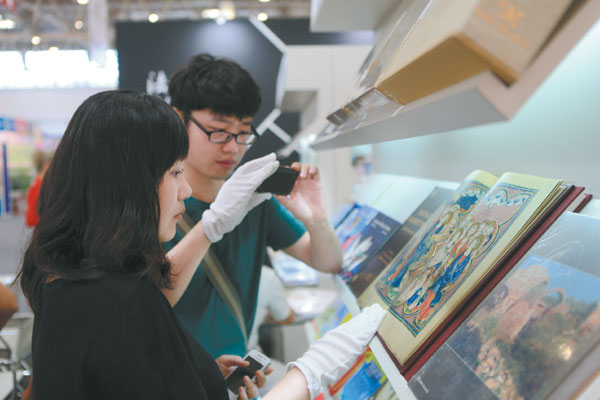Chinese books 'going global' in cyberspace
Updated: 2012-08-30 07:20
By Mei Jia (China Daily)
|
||||||||
Through the work of translators and Sinologists and now with the help of technology, Chinese publishers are beginning to reach a global audience, Liu Binjie, director of the General Administration of Press and Publication, said on Wednesday.
"Translators' works are key, but the ongoing trend of digitalization of publishing presents a rare chance for Chinese books to go further, though big challenges remain," Liu said on the first day of the Beijing International Book Fair on Wednesday.
Digital technology has made cross-continental exchanges possible and efficient, and saves money and time, he said.
 |
|
A visitor reads a book at the 19th Beijing International Book Fair on Wednesday. [Photo/China Daily] |
Liu cited the example of academic journals. Previously, it might take years for the world to learn of the work of Chinese academics and scientists. But thanks to today's technology, almost all of the 250 Chinese journals have English indexes and are available globally.
"China now produces the fourth-largest number of academic papers in the world," Liu said.
Chinese books and publishers have made progress in seeking global audiences. Liu said that though this has been encouraged by the government, some publishers think of "going global" as a political task instead of a cultural initiative.
"We know - and we tested it thoroughly - that we should go global through products, enterprises and investments, not through administrative orders," he added.
Others things lagging behind are the proper ways of international expression and advanced technology, according to Liu.
To achieve global reach in publishing, he said, China attends on average 40 international book fairs a year. The Beijing book fair has grown from a smaller festival 20 years ago to the fourth-largest such event in the world. And Chinese publications are making their ways to readers in 193 countries and regions.
Liu suggested publishers extend their reach through established channels and platforms such as Amazon and Apple applications, instead of setting up new websites for promoting digital books.
Last year alone, some 130,000 Chinese titles were listed on Amazon and had solid sales, he said.
Quality content and professionals are two other keys, Liu also said.
As the digital age advances and is changing lifestyles every day, readers have learned how to choose content with high quality, so publishers should always try to offer electronic publications that have original ideas and information.
Liu expressed determination in setting up an integrated and authoritative e-platform on the national level to introduce Chinese books to multilingual readers and interested international publishers.
To create content providers, he said stronger copyright protection and anti-piracy measures are important.
"We're already making great progress in this aspect," Liu said.
Philip Ruppel, international and professional president of US-based McGraw-Hill Education, said he was at the fair to look for digital opportunities with Chinese publishers.
meijia@chinadaily.com.cn

 Relief reaches isolated village
Relief reaches isolated village
 Rainfall poses new threats to quake-hit region
Rainfall poses new threats to quake-hit region
 Funerals begin for Boston bombing victims
Funerals begin for Boston bombing victims
 Quake takeaway from China's Air Force
Quake takeaway from China's Air Force
 Obama celebrates young inventors at science fair
Obama celebrates young inventors at science fair
 Earth Day marked around the world
Earth Day marked around the world
 Volunteer team helping students find sense of normalcy
Volunteer team helping students find sense of normalcy
 Ethnic groups quick to join rescue efforts
Ethnic groups quick to join rescue efforts
Most Viewed
Editor's Picks

|

|

|

|

|

|
Today's Top News
Health new priority for quake zone
Xi meets US top military officer
Japan's boats driven out of Diaoyu
China mulls online shopping legislation
Bird flu death toll rises to 22
Putin appoints new ambassador to China
Japanese ships blocked from Diaoyu Islands
Inspired by Guan, more Chinese pick up golf
US Weekly

|

|






